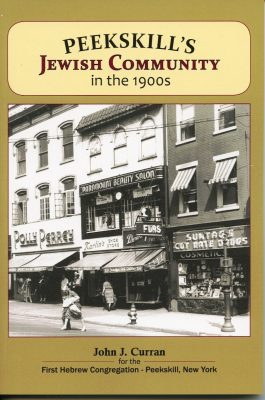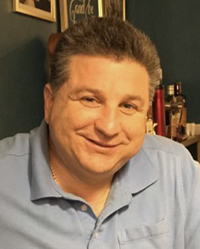Peekskill’s Jewish Community in the 1900s Chronicled
By Abby Luby
The history of the Judaic religion spans several millennia, encompassing a myriad of diasporas that spread across the globe. The great migration of Jews from eastern Europe during the late 19th and early 20th centuries saw many settling in New York City and surrounding areas. Lured by the scenic Hudson and its close proximity to the metropolitan area, many Jews came to Peekskill to build new lives.
A newly released and locally produced book, “Peekskill’s Jewish Community in the 1900s” documents the lives of Jews who lived and prospered in Peekskill from the 1930s to the 1970s. These Jewish businesses shaped the city and generations later many of these families are still active in the community today. The book is a fascinating compendium of decades of aural history, priceless photographs, numerous lists including those of businesses, profiles of business owners and professionals and street-maps, among others.
The initial idea for the book started at the First Hebrew Congregation, one of the oldest synagogues in Westchester formally established in Peekskill in 1904. Dr. Bernard S. Yudowitz, who grew up in Peekskill and whose father owned a downtown fabric store on North Division Street, gave generous donations to First Hebrew. One of Ydowitz’s requests was to write about the close-knit Jewish community of his childhood in the 1940s and 1950s. Yudowitz died in 2018, right before the book was published, but he was able to see an early draft and he liked what he saw.
Gathering stories and old pictures isn’t easy and this project required the input of many. The communal effort to organize vast amounts of archival information for the book included former Peekskill City Historian John Curran, museum board member Robin Goldsand, and First Hebrew congregants Ted Ruback and Charles Newman. Their research had the advantage of tapping into data collected by other organizations, such as the Hudson Valley Gateway Chamber of Commerce, which compiled their own centennial photo journal of downtown Peekskill in the 1940s and 1950s. The Field Library also opened their doors to their collections of historical records.
 On Sunday, July 14, more than 30 people crowded into the Peekskill Museum to learn about the new publication. As slides of vintage photographs cycled through, Curran briefly summarized each chapter. “We found over 150 individual Jewish owned businesses in the 1900s from the museum’s Peekskill Historical Directories,” said Curran, holding up one of the leather-bound directories. He ran through a list of known businesses, their street location in downtown Peekskill and he spoke of their generational legacy of those still living and working in Peekskill. He spoke of families of lawyers, such as Ben Hersh, who worked in Peekskill in the 1950s and 1960s and whose practice is still in Peekskill today.
On Sunday, July 14, more than 30 people crowded into the Peekskill Museum to learn about the new publication. As slides of vintage photographs cycled through, Curran briefly summarized each chapter. “We found over 150 individual Jewish owned businesses in the 1900s from the museum’s Peekskill Historical Directories,” said Curran, holding up one of the leather-bound directories. He ran through a list of known businesses, their street location in downtown Peekskill and he spoke of their generational legacy of those still living and working in Peekskill. He spoke of families of lawyers, such as Ben Hersh, who worked in Peekskill in the 1950s and 1960s and whose practice is still in Peekskill today.
Curran also mentioned Bernard G. Gordon, who later became a New York State Senator. “They called him ‘Bunny,’” a woman in the audience called out. Others in the audience nodded when hearing a familiar name. Curran said the local history in the book was meant for the public at large. “My hope is it will encourage future [Jewish] research in a greater expanse of time, perhaps as far back as 1800s,” he said.
Goldsand spiced up her brief talk with a few jovial ‘Jewish’ jokes. Goldsand has long been interested in Peekskill business history; she is the second generation owning a title insurance business still in Peekskill. She held up several binders of accumulated drafts, proof of the arduous task of compiling the book. “We ordered 200 books and to date, we’ve sold 190,” Goldsand said.
Newman recounted his own childhood of growing up in Peekskill. “I would be with my dad in his store, Paramount Shade and Awning Company on Main Street and he would send me on errands,” he recalled. “I’d trot down to Kurzhals the hardware store, then to Choice Plumbing on North Division. To me it was like a Jewish Mayberry RFD and I was Opie. I felt like we knew everyone, it was a warm, safe environment.”
Newman’s father started a new business selling propane gas and became Paraco, today one of the largest propane companies in the United States. Today, Newman owns an insurance company in downtown Peekskill, which he has filled with Peekskill memorabilia.
Curran’s 112-page book covers up to the late 1970s and the chapter “Where Did Everyone Go?” is about why the First Congregation left their small, Gothic style synagogue at 813 Main street (sold in October 2017 to the Islamic Center of Peekskill) and in 1957, built a new synagogue at 1821 Main Street. Business owners saw how new malls opening along Route 6 with Alexander’s Department Store and Pergament as anchor stores. Sidewalk traffic in Peekskill businesses slowed and when the Beach Shopping Center opened in 1957, many of the downtown businesses relocated there. This shift away from Peekskill, coupled with the turbulent times of the 1960s with destructive riots and fires, left little incentive for Peekskill based businesses to keep their stores downtown. Urban renewal projects soon followed in the 1970s.
There are many gems in “Peekskill’s Jewish Community in the 1900s” – a picture of the great American composer Aaron Copland sitting in the audience at the Paramount next to famed conductor/composer Leonard Bernstein. At the end of the book on a page entitled, “Completing the Circle,” Ted Ruback, a trustee of First Hebrew and who provided a substantial amount of archival material, tells the reader about his wife, Carolyn, who has traced her family lineage back 11 generations to Jan Peeck, the first successful businessman and namesake of Peekskill. This book offers us knowledge of the deep roots in our community to deeply enhance our understanding of the past and how it has shaped our towns and cities today.
“Peekskill’s Jewish Community in the 1900s” is available for sale at the Peekskill Museum peekskillmuseum.org/
or by contacting First Hebrew Congregation, 1821 Main St., [914] 739-0500, fhc@firsthebrew.org, firsthebrew.org).

Rick has more than 40 years’ experience covering local news in Westchester and Putnam counties, running the gamut from politics and crime to sports and human interest. He has been an editor at Examiner Media since 2012. Read more from Rick’s editor-author bio here. Read Rick’s work here: https://www.theexaminernews.com/author/pezzullo_rick-writer/
